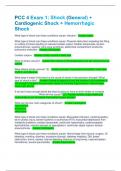PCC 4 Exam 1: Shock (General) +
Cardiogenic Shock + Hemorrhagic
Shock
What type of shock can these conditions cause: infection - Answer-septic
What type of shock can these conditions cause: Physical obstruction impeding the filling
or outflow of blood resulting in reduced cardiac output: Cardiac tamponade, tension
pneumothorax, superior vena cava syndrome, abdominal compartment syndrome,
pulmonary embolism - Answer-Obstructive
Cardiac output= - Answer-stroke volume x heart rate
What is stroke volume? - Answer-the volume of blood ejected by the left ventricle during
systole
What effects stroke volume? (5) - Answer-preload, myocardial contractility, heart rate,
rhythm, and afterload
What does it mean if the blood is the cause of shock in the perfusion triangle? What
type of shock is this? - Answer-if blood or plasma is lost, the volume in the container is
not enough to support the perfusion needs of the body (Hypovolemic: Hemorrhage,
Fluid Loss, Burns)
If we don't have enough blood the heart is going to have to work harder to increase
_________________. What will this cause? (2) - Answer-cardiac output leading to
tachycardia an an increased myocardial oxygen demand
What are the four main categories of shock? - Answer-cardiogenic
hypovolemic
distributive
obstructive
What type of shock can these conditions cause: Myocardial infarction, cardiomyopathy,
blunt cardiac injury, severe systemic or pulmonary HTN, myocardial depression from
metabolic problems, cardiac tamponade, ventricular hypertrophy, cardiomyopathy,
dysrhythmias, valvular stenosis or regurgitation, ventricular septal rupture, tension
pneumothorax - Answer-cardiogenic
What type of shock can these conditions cause: Hemorrhage from trauma, surgery, GI
bleeding; vomiting, diarrhea, excessive diuresis, diabetes insipidus, DM, bowel
obstruction, burns, ascites, internal bleeding (fracture of long bones, ruptured spleen,
hemothorax, severe pancreatitis) - Answer-Hypovolemic
, What is shock? - Answer-a syndrome characterized by decreased tissue perfusion and
impaired cellular metabolism.
What are the three components of the perfusion triangle? - Answer-heart, blood
vessels, blood
What does it mean if the heart is the cause of shock in the perfusion triangle? What type
of shock is this? - Answer-damage to the heart by disease or injury has occurred. It
cannot move blood adequately to support perfusion. (Cardiogenic shock)
What does it mean if the blood vessels are the cause of shock in the perfusion triangle?
What type of shock is this? - Answer-if all the vessels dilate at once, the amount of
blood volume is not enough to fill the system and provide adequate perfusion to the
body.
Distributive shock: sepsis, anaphylactic, neurogenic, drug injections
What type of shock can these conditions cause: severe pain, drugs, hypoglycemia,
injury - Answer-neurogenic
What type of shock can these conditions cause: hypersensitivity reaction - Answer-
anaphylactic
What is afterload? - Answer-the resistance in the peripheral blood vessels
How does decreased preload lead to shock? - Answer-there is decreased stroke
volume leading to decreased cardiac output causing decreased perfusion and leads to
decrease blood return to the heart.
How does decreased myocardial contractility lead to shock? What type of condition has
decreased myocardial contractility? - Answer-an overstretched cardiac muscle causes
there to be no elasticity left causing cardiac output to fall leading to decreased
perfusion. Heart failure
How does increased afterload lead to shock? - Answer-it causes resistance in the
peripheral blood vessels requiring more pressure from the LV to propel blood forward.
What is the body's initial compensated response to maintain cardiac output when there
is decreased perfusion? - Answer-to increase heart rate
How does aldosterone help maintain perfusion? - Answer-causes renal retention of
sodium (and water reabsorption) to increase blood volume in order to increase cardiac
output and blood pressure




